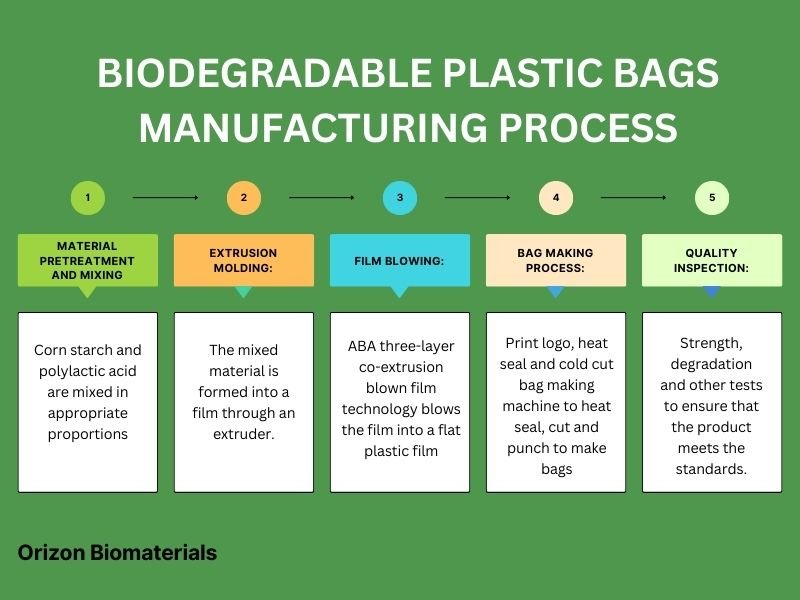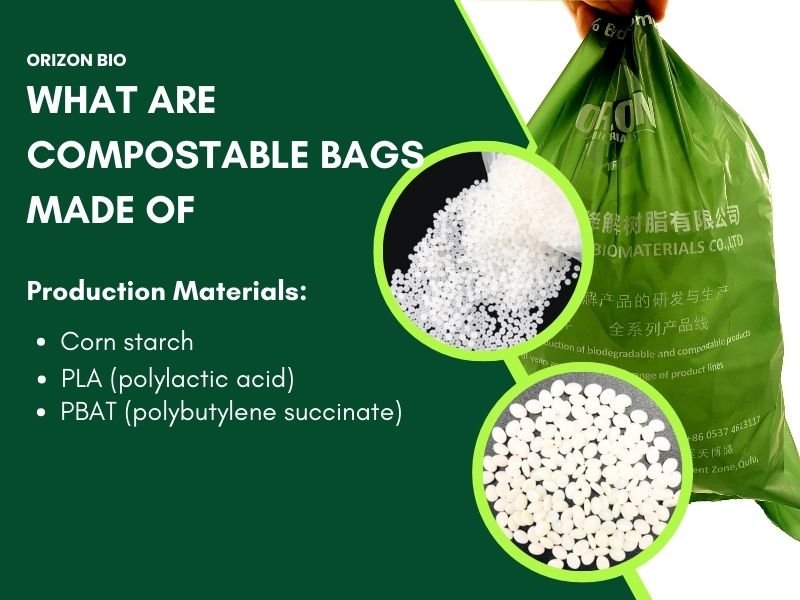When you see a dazzling array of dog poop bags in the supermarket, many of them labeled “green” and expensive, you might wonder: are dog poop bags biodegradable?
Years of experience in the industry have taught me that the term “biodegradable” itself is a highly misleading term. This article will explain what biodegradable dog poop bags actually look like.
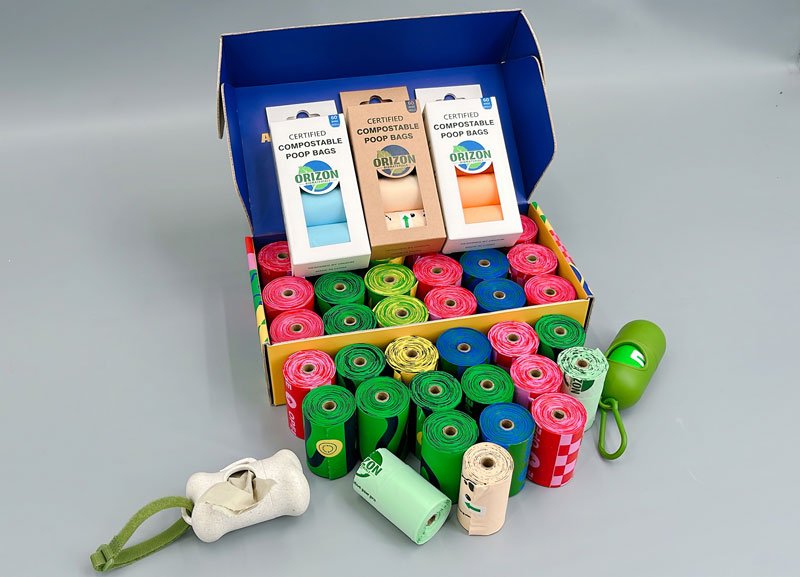
Are Dog Poop Bags Biodegradable?
As a manufacturer of biodegradable and compostable bags with 16 years of experience,I can clearly say that it depends on the raw materials used and how the bags are ultimately disposed of. If dog poop bags are made from compostable materials like PBAT, PLA, and starch, they can degrade within 90-180 days in industrial composting. Compostable bags must be verified by a rigorous third-party organization (EU OK Compost home composting certification, EU EN13432, Australian AS4736 and AS5810, and BPI ASTM D6400 certificates.) to be considered compostable. If there’s no certification, it’s just hype and will likely take longer to degrade.
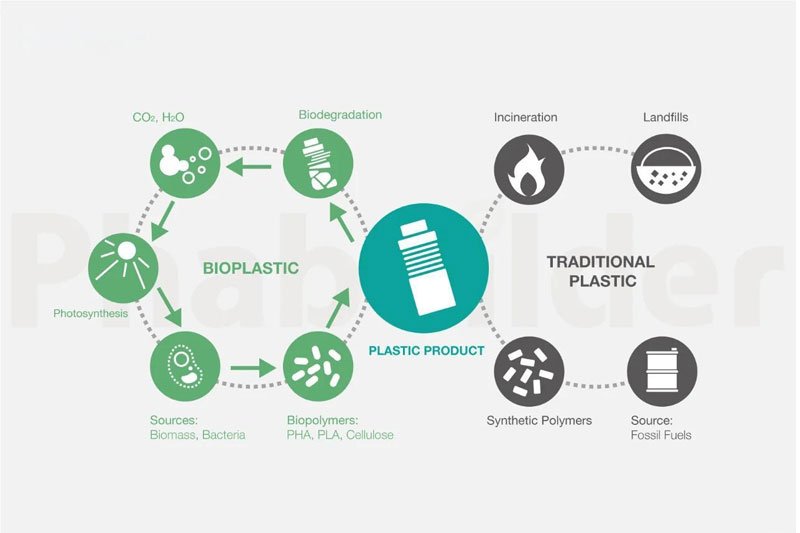
What Is Biodegradable?
Biodegradable is a marketing term that has emerged in recent years. It refers to the process by which organic matter is broken down by microorganisms into harmless substances such as carbon dioxide and water. The ability to degrade depends on temperature, humidity, and oxygen levels, and is not limited by time or environmental conditions. Decomposition time varies from item to item; biodegradable plastic bags can take hundreds of years to decompose
Common Types of Biodegradable Plastic Bags on the Market:
Oxo-biodegradable
Traditional plastics contain chemical additives such as EPI. These plastics can only break down into tiny, toxic microplastics when exposed to light and oxygen. Microplastics are a serious and hazardous pollutant, contaminating soil and water sources. They have been banned in the EU.
Compostable
Compostable pet waste bags have stricter requirements and must meet third-party certification based on rigorous scientific standards (such as ASTM D6400 in the US or EN 13432 in Europe). Under specific industrial composting conditions (oxygen, high temperature, and abundant microorganisms), they completely decompose into water, carbon dioxide, and non-toxic organic matter within 90-180 days.
A study by X-MOL found that certain corn starch bags can decompose 100% in industrial compost within 90 days, but the decomposition rate is significantly slower in home compost or landfills, and may even produce microplastics.
Don’t trust the term “Biodegradable” lightly. If you’re looking for true green sustainability, use “Compostable” and the authoritative certification behind it.
What Are Biodegradable Dog Poop Bags?
Biodegradable Vs Compostable Dog Poop Bag
Currently, there are two types of dog poop bags that can be considered biodegradable:
- Biodegradable: Biodegradable materials contain petrochemical components through microbial decomposition, which can take years and may produce microplastics.
- Compostable: Biodegradable bags completely decompose into organic matter (such as water, carbon dioxide, and biomass) in a specific composting environment (such as home or industrial composting) within 6-12 months, leaving no toxic residue.
Material Introduction:
- PLA (polylactic acid): Derived from corn or sugarcane, suitable for compostable bags, requiring a high-temperature composting environment (140-160°F).
- PBAT: Blended with PLA to enhance toughness and decompose faster, commonly used in biodegradable bags.
- Cornstarch: A natural ingredient that decomposes faster but is slightly less strong.
Certification Standards:
- ASTM D6400: A US standard that ensures bags fully decompose in industrial composting facilities.
- EN 13432: A European standard similar to ASTM D6400, applicable to compostable bags.
- HOME OK COMPOST: Suitable for home composting, with more relaxed decomposition conditions.
- BPI Certified: A leading North American third-party certification agency that verifies the compostability of bags.
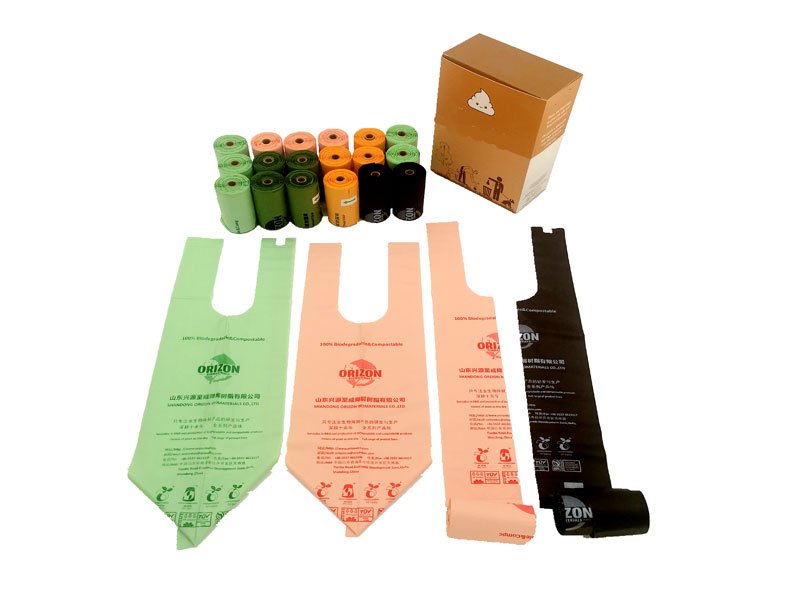
The Pros and Cons of Biodegradable Dog Poop Bags
| Pros | Cons |
|---|---|
| Reduces Long-term Pollution: Unlike traditional plastic bags (which take centuries to decompose), biodegradable bags break down faster under proper conditions, reducing environmental impact. | Higher Cost: Biodegradable bags typically cost 2-3 times more than regular plastic bags (e.g., 100 biodegradable bags cost ~$5-10 vs. ~$2-3 for regular bags). |
| Aligns with Eco-friendly Trends: Meets the demand of pet owners for sustainable products, ideal for areas with composting facilities. | Requires Specific Decomposition Conditions: Compostable bags need industrial or home composting environments to break down effectively; otherwise, they perform like regular plastic bags. |
| Variety of Options: Available with features like zippers or leak-proof designs, suitable for various scenarios. | Potentially Weaker Strength: Some biodegradable bags (e.g., corn starch-based) may tear in wet conditions or when handling large dog waste. |
How Long Do Biodegradable Dog Poop Bags Take to Decompose
The biodegradability time for dog poop bags depends on the raw materials and materials used in the bag, as well as the environment in which they are stored. Degradation times vary in different environments.
Ideal Degradation Time:
Oxo-biodegradable bags: Complete degradation may take several months to several years
Uncertified “biodegradable bags”: May take many years
Certified compostable bags (industrial grade): 90-180 days (in an industrial composting facility)
Certified compostable bags (home grade): Complete degradation in 6-12 months (in a well-managed home compost pile)
Degradation time in landfills:
No matter how expensive or eco-friendly your bag is, if it’s thrown in the regular trash and ends up in the dense, oxygen-depleted conditions of a landfill, its degradation process will be limited, potentially taking decades to centuries.
What Happens to Used Dog Poop Bags?
When we judge a bag’s environmental friendliness, the key isn’t the material it’s made of, but how it’s ultimately disposed of.
- Landfill Reality
Large amounts of garbage piled together without enough oxygen prevent the organic matter in compostable bags from chemically reacting. If decomposed in an anaerobic environment for a long time, it can produce methane, contributing to global warming. Therefore, dog poop bags bad for the environment if that is how it is handled.
- Industrial Composting
This allows the waste in compostable bags to be effectively composted. However, there’s a problem: how do you know if there’s an industrial composting facility near your home? After all, it’s expensive.
Open Google and search “[your city name] + industrial composting + pet waste” or “[your city] + industrial composting + pet waste.” If you find one, consider yourself lucky.
- Home Composting
Dog poop can contain pathogens harmful to humans (such as E. coli, Salmonella, and parasite eggs). Composted dog poop cannot be used in soil for plants or fruit. A separate, well-established hot composting system is required to sterilize the compost. Choose bags that have the “OK compost HOME” certification.
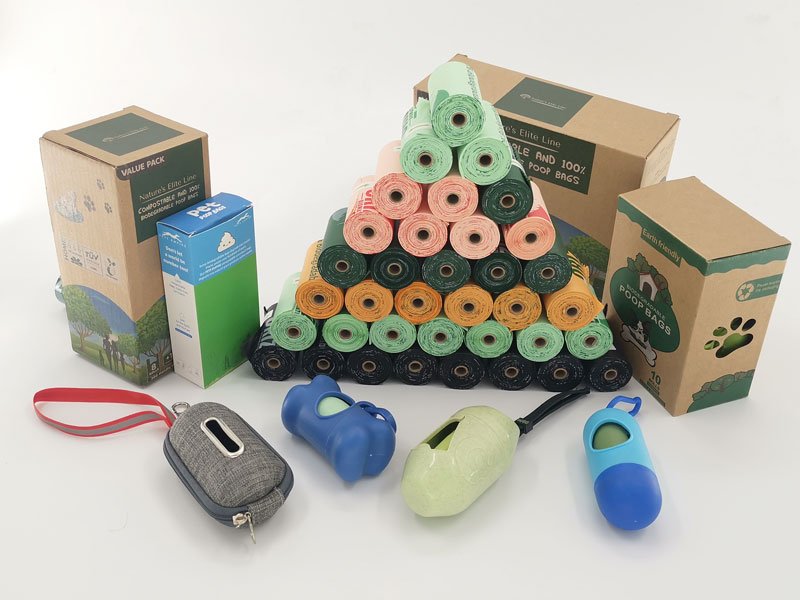
What Should I Do if There Is No Industrial Composting Facility Where I Live?
In this situation, we need to find alternatives to eco-friendly bags. One option is 100% recyclable bags, while another is compostable bags containing plant-based ingredients.
- Bags Made from 100% Recycled Plastic
This is more sustainable, as it means that a portion of plastic bags will not end up in the ocean or soil, reducing the harmful effects of waste pollution. These bags are typically thicker and less expensive. Furthermore, they remain stable as an inert material in landfills, awaiting future technologies for centuries to degrade or be reused.
- Plant-Based Compostable Bags
Reducing dependence on fossil fuels. These bags are made from plant-based materials, such as cornstarch or sugarcane starch, which are renewable resources. These bags typically have a softer, silky texture. Their emergence represents a more advanced and ideal future. However, their disadvantage is that they cannot effectively decompose in the oxygen-deficient environment of landfills, producing methane gas.
Are Eco-Friendly Dog Poop Bags so Expensive That They’re Just a Tax on Your Money?
Plant-based bags can cost hundreds of dollars more per year than regular bags. Are these eco-friendly bags worth it?
After understanding the principles behind them, I don’t think they’re a “tax on your money.” They’re a recognition and support of environmental protection. The extra money you pay is supporting a more sustainable industry. The price of green poop bags reflects the environmental efforts put into their production.
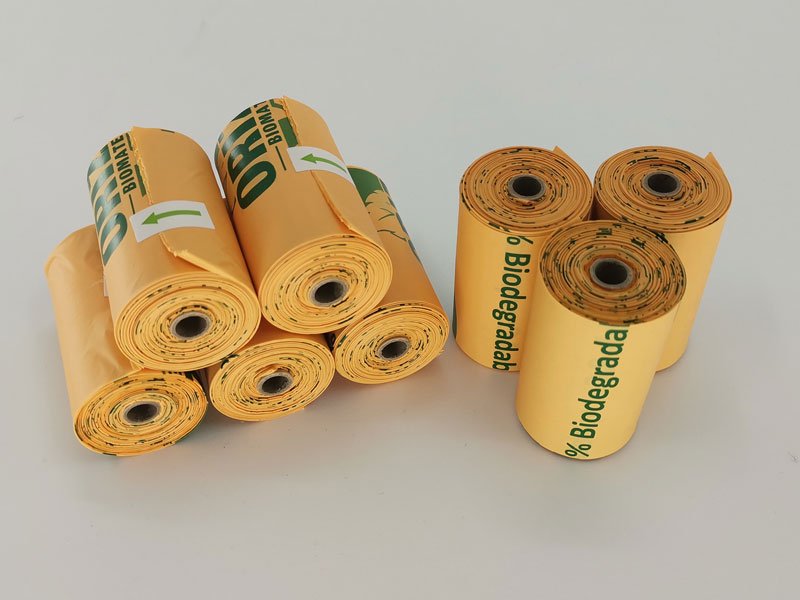
How to Choose the Right Dog Poop Bag
Classification by Dog Breed
- Small dogs (such as Chihuahuas and Pomeranians): For low-volume poop, lightweight, biodegradable bags (such as Pet N Pet, approximately $5 for 100 bags) are recommended for cost-effective and portable use.
- Medium dogs (such as Corgis and Beagles): For medium-thickness bags (such as BioBag, 12 microns thick, approximately $7 for 100 bags) are recommended for both durability and environmental friendliness.
- Large dogs (such as Golden Retrievers and Labradors): For high-volume poop, high-strength, leak-proof bags (such as Unni, 15 microns thick or higher, approximately $9 for 100 bags) are recommended.
Classification by Use Scenario
- Daily dog walking: Choose a portable bag with a roll-up design for easy portability (such as Earth Rated, with a dispenser, approximately $8 for 100 bags).
- Travel: Prefer bags with a hook or dispenser for easy attachment to a backpack or leash (such as Pogi’s, approximately $7 for 100 bags).
- For home storage: Use bags with a strong seal to prevent odor leakage (such as the BioBag leak-proof bag, about $10 for 100).
Recommended Brands
The following are high-quality biodegradable/compostable bag brands that we’ve tested:
- Unni: BPI-certified, thick, suitable for large dogs, available on Amazon.
- BioBag: ASTM D6400-certified, suitable for home composting, moderately strong.
- Pogi’s: Comes with a dispenser, highly portable, and perfect for travel.
- Earth Rated: Eco-friendly materials, a variety of thicknesses available, and a great value.
- Pet N Pet: Budget-friendly, suitable for small dogs, and affordable.
Conclusion
Are dog poop bags biodegrable? The answer is: Compostable dog poop bags can degrade in 90-180 days in industrial composting equipment. Dog poop bags made from other materials take longer to degrade. Please look for “compostable bags.” I hope this article helps.
FAQ
Can I flush dog poop bags down the toilet?
Absolutely not! This can easily clog drains, causing more trouble and repair costs.
Can I put used dog poop bags in the recycling bin?
Absolutely not! The poop will contaminate the entire batch of recyclables, causing them to be treated as garbage.
Are biodegradable bags suitable for large dogs?
Yes, but you should choose a high-strength bag (such as Unni, with a thickness of 15 microns or more) to prevent breakage.
Will biodegradable bags break in the rain?
Some low-quality bags may break in humid environments. We recommend choosing certified bags with a thickness of 12 microns or more.
How can I store biodegradable bags to extend their lifespan?
Store in a dry, cool place, away from direct sunlight and high temperatures to prevent premature degradation of the material.

